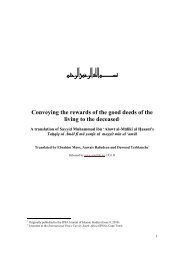al_etidaal_gn
al_etidaal_gn
al_etidaal_gn
Create successful ePaper yourself
Turn your PDF publications into a flip-book with our unique Google optimized e-Paper software.
“Sh<strong>al</strong>l I tell you who is the next best after him?”<br />
The Sahabah (Radi<strong>al</strong>lahu anhum) replied: “Yes, do tell us!”<br />
Rasulullah (S<strong>al</strong>l<strong>al</strong>lahu Alayhi Was<strong>al</strong>lam) said: “It is that person who goes to settle in<br />
seclusion in a mountain cavern <strong>al</strong>l <strong>al</strong>one, perfonns his S<strong>al</strong>aah, gives his Zakaat and is<br />
saved from the evils of men.”<br />
According to another Hadeeth: “How fortunate and good is that man who keeps his<br />
tongue under control, remains secluded in his house and continues to cry over his sins.”<br />
Sayyidina Uqbah (Radi<strong>al</strong>lahu anhum) says: “I once asked Rasulullah (S<strong>al</strong>l<strong>al</strong>lahu Alayhi<br />
Was<strong>al</strong>lam) what was the way towards s<strong>al</strong>vation.”<br />
He replied: “Keep control over your tongue,, remain inside your home and continue to<br />
cry over your sins in repentance.<br />
In <strong>al</strong>l these things there is one thing we must stress once again. It is this when any<br />
prohibited impermissible thing is seen one should dislike it and consider it bad. One<br />
should feel sorrow at its appearance. Such evil should be intensely resented. This is that<br />
which in the first Hadeeth quoted has been c<strong>al</strong>led the lowest grade of Imaan.<br />
There is a Hadeeth which says that Allah commanded Jibreel (Alayhis S<strong>al</strong>aam) to destroy<br />
a certain town and its people. Jibreel (Alayhis S<strong>al</strong>aam) said: “0 Allah, in that town there<br />
is such-and-such a devout servant of yours, who has never ever disobeyed you.”<br />
Allah said: “Destroy that town in spite of him because never once did a wrinkle appear on<br />
his face on account of (the displeasure at the sins committed against Me.” (Mishkat)<br />
In other words, he has continued to look on while my laws were disobeyed and never<br />
once showed any dislike and resentment.<br />
In another Hadeeth Rasulullah (S<strong>al</strong>l<strong>al</strong>lahu Alayhi Was<strong>al</strong>lam) said: “Whosoever joins in<br />
the doing of a impermissible act while he resents it (and only does so because of force of<br />
circumstances) sh<strong>al</strong>l be as one who never joined in the act. And whosoever does not join<br />
in such an act but likes it, is like one who participated in it.” (Majma-ul-Zawaaid)<br />
It is indeed a very dangerous thing to be pleased with any sinful thing, no matter in whom<br />
it be found. And the root of <strong>al</strong>l sin is kufr. How much more dangerous is it not to be<br />
pleased with kufr?<br />
Hazrat Mujaddid Alfi Thani wrote a very frightening story in his Makaateed (epistles),<br />
with a strong lesson for us. He says that he once went to visit a very sick man. When he<br />
came there he found the man very near death. “1 concentrated my spiritu<strong>al</strong> attention on<br />
him and found that his heart was filled with darkness. Again I focused my spiritu<strong>al</strong><br />
attention on his heart for a long time in order to drive off the darkness, but the darkness<br />
Al- Eti’da<strong>al</strong> Fi Maraatibur- Rija<strong>al</strong> 188




